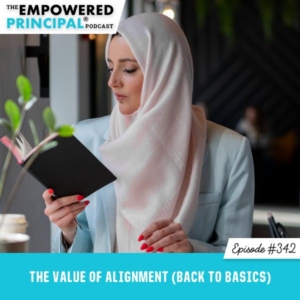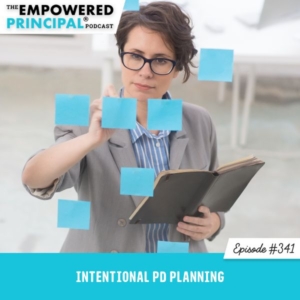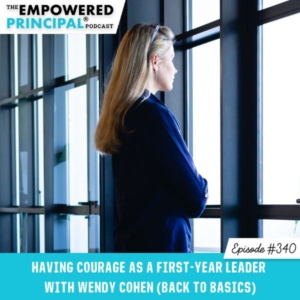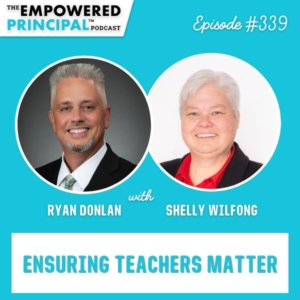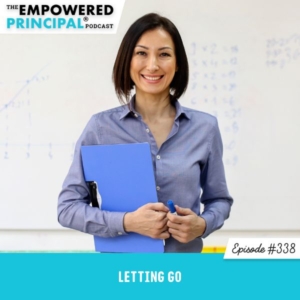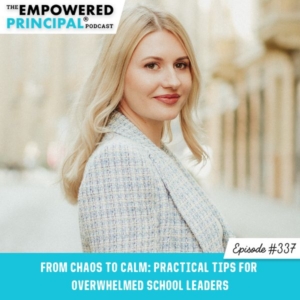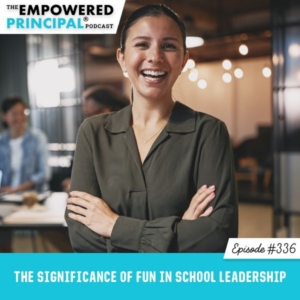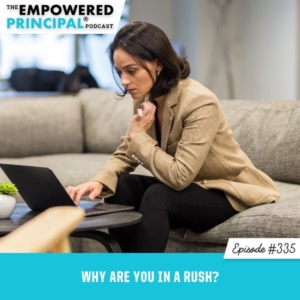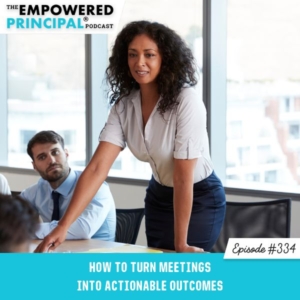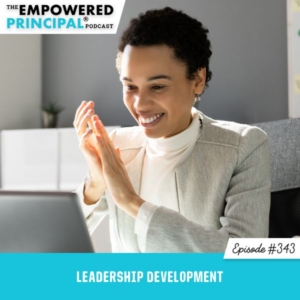
How many of you can say you were fully trained, mentored, and supported as you were being onboarded as a school principal, all while being given the grace and space to be new and unsure of yourself? I’m willing to bet most of you would say you weren’t.
The school leader’s job description often requires being an expert in it all while doing everything at once. Whether you’re making the shift from good to great or great to exceptional, you are not alone if you feel like you don’t know what you’re doing. That’s why it’s my mission to make leadership development a mainstream practice in every school community, and I show you how I’m doing this in today’s episode.
Tune in this week to learn why we desperately need leadership development for all school principals and the common patterns and experiences I’ve witnessed among brand-new leaders. I share how The Empowered Principal Collaborative is the container you need if you’re ready to stop feeling in over your head and cultivate the confidence necessary to be the leader your school needs.
The doors to the next cohort of The Empowered Principal® Collaborative are open! This is the time to decide: do you want to lead your school for the rest of the year as you are right now, or take your leadership skills to the next level? Join us today to become a member of the only certified life and leadership coaching program for school leaders in the country by clicking here.
What You’ll Learn From this Episode:
- My experience of making the transition from teaching to administration.
- The commonalities all school leaders experience as they step into their new roles.
- Why I created The Empowered Principal Collaborative.
- What is required of you as a brand-new school leader.
- How focus and constraint help you keep your overwhelm in check.
Listen to the Full Episode:
Featured on the Show:
- If you’re ready to start the work of transforming your mindset and start planning your next school year, the Empowered Principal® Coaching Program is opening its doors. Click here to schedule a consult to learn more!
- For a free call to review your year, get in touch with me: Facebook | Instagram | LinkedIn
- Join The Empowered Principal® Facebook Group, Emotional Support for School Leaders, today!
- Sign up for The Empowered Principal® Newsletter
- Podcast Quick-start Guide
- Schedule a 15-minute Q&A Call with me
- Join our Facebook group to be involved in The Summer of Fun!

Full Episode Transcript:
Hello empowered principals. Welcome to episode 343.
Welcome to The Empowered Principal® Podcast, a not so typical educational resource that will teach you how to gain control of your career and get emotionally fit to lead your school and your life with joy by refining your most powerful tool, your mind. Here’s your host certified life coach Angela Kelly Robeck.
Well, hello, hello, hello, my lovely empowered principals. How are you today? Happy Tuesday. Welcome to the podcast. Hey, you guys, if you’re new to the podcast, come say hi. Join the Facebook group and say hi, or drop me an email and say hello. You’re new to the podcast. Follow me on social media. Come on Instagram, Angela Kelly Coaching. You can find me on Facebook personally and professionally. Come on over and mingle. I want to get to know you.
You could also leave a review. That helps me. I look through the reviews. If you leave a review for the podcast, I try to shout you out personally here on the podcast. So, I love meeting new people. I love meeting new leaders or aspiring leaders. You all inspire me so, so very much.
Here we are in July. We’re ramping back up as school leaders, and we’re thinking about next year. We’re preparing. We’re planning. We are getting master calendars scheduled away, making sure everybody’s hired and in the right spot, making sure the schools are cleaned and ready for teachers to come back into those classrooms. You are thinking three months ahead of your teachers, and July, in your mind, you’re already back to school.
So, I want to talk about you, not your school, not your vision, not your teachers, not your students, not your district admins. I want to talk about you going from being a new leader to a good leader to a great leader to an exceptional principal.
First of all, I’m going to invite you very quickly into the Summer of Fun Challenge because we still have a couple weeks left. It’s so easy. If you’re on Facebook, all you have to do is search for The Empowered Principal® Facebook group. You come into the group. If you are a school leader or you’re an aspiring school leader, you’re welcome to join the group. I do a little bit of an intake form because I don’t want robots coming in and ruining our space or spammers and all of that or people soliciting you. I don’t want that. This is a safe, clean space.
So, if you are an actual school leader, you’re an aspiring school leader, answer the three questions, come on into the group, and all you have to do is share photos, pics, posts of your summer fun that you’re having. Just share it in the group, and you can also cheerlead other people on. Every time you either post or comment on somebody else’s, your name is entered multiple times into a weekly drawing. For every single post and every single comment, you get one entry into the drawing for the week.
It is the easiest way to manifest some significant cash into your life and also to check out what’s going on in the world of the Empowered Principal® programs and EPC. Because there is a $50 gift card from Amazon, which I love me some Amazon. It saves me so much time.
More importantly, the real power, the real money that you’re winning is 90% off of the EPC program for one full year of coaching. It’s normally $1,997. The winner, the weekly winner of SOF, will receive 90% off. So you are getting a full year of coaching for only $197. I think that is insane. It’s just enough to have some skin in the game, but you are going to gain so much. It’s insane. This is an epic program.
I’m going to talk more about it in a minute, but what I want you to know is that you’re basically going to win $1,850 because you’re getting the $50 Amazon card, but you’re basically saving $1,800 in the Empowered Principal® program. You can’t lose.
You can come in for a year, check out EPC. If it’s amazing, you can stay. If it’s not your cup of tea, I understand. I’m not everybody’s cup of tea. But for those of you who are interested, this is the perfect way to sign up and be eligible to receive 90% off your entrance fee.
So I want to let you know that I’ve done one round of EPC and after that round, I’ve really reflected and enhanced the experience for everybody in the program. Because I want you to come into this program trusting and believing that you’re going to receive the support that you need. We’re going to celebrate your wins.
We’re going to track your progress in a way that inspires you, not in a negative way. It’s for fun. We’re doing all of this to celebrate and win and be like oh my gosh, I hadn’t realized how much I’ve grown in this area. So I’ve created some really simple ways to track and celebrate your progress.
But what I’m going to be doing more in EPC than I did last year was teach. I’m going to teach you, mentor you, teach you the skills that you need to be an empowered principal so you know and you learn how to create the exact results that you want for yourself and your school. Okay?
All right, let’s dive in. I want you to think about the experience that you have had in the past as you transitioned from teaching to administration, or the experience that you anticipate having as you transition from teaching to administration. I will share my experience with you and then I want you to feel free to share yours in the Facebook group, or you can share with me on social media because the stories of transitioning into leadership, they’re astounding to me, but they’re very consistent and there’s a lot of similarity and there’s a pattern, some commonalities in which we all experience. Okay?
I was tapped on the shoulder as a kindergarten teacher. You should be a teacher leader. You’ve got great energy, great charisma. Parents love you. You get amazing results with your kids. Your classroom management’s on point. You’re doing all of the initiatives in the classroom. You’re a shining example.
I didn’t want to go into school leadership, but my superintendent at the time was very charming. He was very charismatic himself, and I really, really followed him. I believed in him as a leader. I trusted him, he was, had his eye on the ball. He knew what he wanted, and he knew how to sell people on themselves. So I really believed in myself because he believed in me, and he sold me on me.
So I went ahead, and I already had my master’s in education. I went ahead and got my credential in administration, but I really didn’t want to go into administration. So I was holding on to it for a while. I became an instructional, well, first I was a reading specialist. After I was in kindergarten, became an instructional coach. I did that for a year, and that was the year that I started to transition my thinking. I started to visualize myself as a potential leader.
I was working with one of my best friends, and she was the principal at the time. I was the instructional coach, and that was the closest I’d ever been to a leadership position. So I was watching her do the job. I was listening to her process how she was doing the job, listening to all the highs, the lows, the wins, the losses, the good, bad, and ugly. But there was a moment, I can remember it, where I was standing. I can remember what I was wearing.
I remember thinking to myself I might be able to do this. She kept saying, “Oh, for sure. If I can do it, you can do it.” Everybody tells you that, but you’re like that doesn’t sound as reassuring as you might think it sounds. If I can do it, anybody can do it. It’s like yeah, but you already did it, and I haven’t done it. So there’s still this gap between where I’m at and where I would like to go. There doesn’t appear to be a bridge between here and there. I feel like if I take the first next step, I’m going to fall all the way down into the canyon and never return.
So I watched her, I listened, I really started tuning in. But what I did was I kept envisioning myself as a leader. I kept believing that it was possible for me to learn how to be a leader, for me to grow into being a leader, for me to handle it emotionally, mentally, just intellectually, skill based wise. I went from zero belief in myself to like 10% belief to maybe 25% belief.
Then I got to a point where I was right around the 50% mark. I was like I’m pretty sure I could do this. I might fail. But what I do know is that I’m strong, I’m bold, I will figure it out. I’m confident in that I will figure it out. I’m not confident in my leadership skills, but I’m confident that I will do my best to figure it out.
When I thought that thought, that was when I tipped over into being ready to apply, which is exactly what happened. So the spring came, positions started opening, I was asked to apply. I was so scared. Gosh, applying for leadership positions in front of people I’ve worked with for 15 years, it felt scarier than talking to strangers for some reason.
Because it felt like I couldn’t fake it until I made it. I couldn’t enhance. I couldn’t say something that wasn’t true. Not that I would ever do that. But you know how when you’re in an interview, like you’re trying to put forward your best foot, and you want to make yourself sound as enticing as possible? But these are people who knew me super well. So there was no fudging it.
I was so nervous. I applied for an AP position at a middle school because I thought it would be easier to start out as an AP than to take on a full school by myself. I didn’t get that position. My people had to call me and give me the news that I, they thanked me for the interview, but I didn’t make it to the second round. I was devastated. I cried on the couch after school when I found out.
I mean, it was a few days later, but I remember thinking like why did they put me through this? That was just so unnecessary. But after the tears, I was like okay, what did I learn in that interview? What worked? What didn’t? What would I say or do differently next time?
My friend who was the principal when I was her instructional coach and I was applying said, “Just tell them what you know. Speak from your heart. You’re an educator at heart. You know what you’re doing. You’ve got this. But speak to you. Be you in that interview. Don’t try to tell them what you think they want to hear. Tell them who you are and what you know and how you’re going to bring you to the table.”
I applied for an elementary position at a brand new school. They were opening a brand new school at a brand new site with all the construction happening, and I got hired for that position. The superintendent who had encouraged me to come to the surface had an amazing leadership development program within our district, which is one of the reasons I got tapped on the shoulder for because I had participated in that two-year leadership development training program.
Which I think was like beyond his years of wisdom and vision at the time. I didn’t know of any other school who was offering like a leadership development to develop leaders from within the district to retain the district and to have leaders who taught in the district who had already some clout and some understanding and some relationship and connections and just a deep understanding of the community, of the district, and the operations of our particular district. So it was very avant-garde to me at the time.
I went through that program. I ended up landing this position, but then that superintendent left and another superintendent stepped in. I was very scared because I didn’t have my person. This new person was coming up. I knew this person. He was an internal hire, but his style was very different. What ended up happening was we are so happy you’re here, Angela. We’re so grateful you’re taking on this brand new school as a brand new principal. Like, way to go. That’s very brave of you. Here are your keys. Here’s your office. Bye. Have a nice life. Go figure out life.
So as you can imagine, I tried to fake it. I tried to pretend I was a leader. I tried to talk like a leader and walk like a leader and dress like a leader. That definitely did help. It boosted my confidence to a point.
But the truth was, I didn’t have the skills to be a leader, especially to open a brand new school, to create community, to create a collaborative environment, to create a culture from nothing to something, to develop the school site council and to develop the ELAC program and to develop all of it. The PLC foundation, all of it was brand new. Not to mention, I was also doing construction management. For those of you who’ve ever had construction on your campus, you can relate to this.
I was in over my head. I was assigned a mentor that was required to take me through these modules that I had to go through, but that program wasn’t exactly what I needed. Fortunately, my coach at the time, my mentor, she had the skill set to actually coach me and guide me. Otherwise, I’m pretty confident I would have resigned from the position and gone back to teaching or instructional coaching within the first two years of the job. I’m almost positive of that because it was so hard. But I had her. She kept me going.
All of this to say, I figured it out the hard way, learning by doing. I felt like somebody had thrown me into a dryer, and I was just bouncing around trying to figure out life. It was learning by fire hose. You can learn that way, by the way. You can do that. It’s very painful, but you can do it, which is what I did.
So here’s the thing I’ve noticed about school leadership. I have yet to meet a leader in my professional world or now as a coach. I coach people all across the country. I have yet to meet a leader who can refute that there is a leadership development program in the sense that when they hire you, they say, “Hi, welcome to the team. We are so happy to have hired you. You’re such a great match for us. I can’t wait to get to know you better and to work with you. Here’s your campus, here’s your office, and here are your keys.” Now that’s where most of the onboarding stops.
But imagine, imagine a world where they say, “And we’re going to fully onboard and train you. We’re going to teach you and provide you with all the skills you need to navigate this job. We’re going to teach you how to people manage, how to time manage, how to maintain a balanced lifestyle, how to effectively plan and map out your calendar for the short and long term, how to handle parents, how to navigate students, how to emotionally manage other people and yourself so that you can stay grounded as you work through difficult situations.
“We’re going to teach you how to student manage, manage behaviors, manage IEPs, facilitate staff meetings, develop effective professional development meetings. We’re going to teach you all of this. We’re going to teach you how to be an instructional leader while also balancing the work of being an operations manager of your school.”
Because that’s what the job description is. Please do everything all at once. Be an expert at it all. That’s the job description. Can you imagine if this type of training was included in your new position?
I wish I could do a raise of hands. How many of the listeners of this podcast have had that experience where you’ve been fully onboarded, fully supported, fully trained, fully mentored, fully coached, and you were given permission and grace and space to be new and awkward and clumsy and not know what you’re doing, to not know the answers, to gradually work up into the position, to get it right, to learn deeply.
I don’t know, if we did a show of hands, how many people have had that experience, that kind of mentorship. Where someone says hey, here is the real truth about this job. The real truth is this. There’s always going to be too much to do and not enough time. There are always going to be conflicting priorities and demands coming at you from all directions.
You’re going to be pulled in many directions. You’re going to feel overwhelmed almost all of the time. There’s always going to be pressure to do more, to do it better. But you know what? That’s okay. We’re going to support you in handling that.
It feels like a dream come true. It feels like the Disneyland of school leadership, which is what I’m trying to create over here. No one offered that to me. They said, thank you so much. We needed you to fill this position. You have fulfilled a need of ours. Here are your keys. Go enjoy your life with a smile on your face. Be the face of the district. Please don’t ask us any questions because we’re too busy figuring life out for ourselves. Go do you. You need to know how to do this. Bye.
It’s like oh, okay. Wow. Let me evolve my self-concept in about two days. That is why I created EPC, the Empowered Principal® Collaborative. I needed to fill a gap. There was a void. Look, teachers, they have all kinds of resources, instructional coaches. They have grade level support. They have PLCs. They get mentors, buddy teachers, right? But we, we get the job, and then we’re expected to do the job.
You might get sent to a conference. Oh, hey, go learn how to improve school culture, or hey, go improve your practice in diversity, equity, and inclusion. Go to a weekend workshop and come back and then have that fixed. How are you supposed to do that? How do you integrate a conference into who you are, into your identity, into your practice as a school leader?
I want you to think about the business of education. The business of education is to continue to learn and to develop and to grow. When you’re a brand new leader, there is an entirely new skill set that you’re going to have to learn. You’re going to have to decide which skill you’re going to focus on because there’s too many. You have to break it down into chunks.
You learn a particular skill this year or this quarter or this semester. Build up your muscles one skill at a time. There’s just too many to learn at once. It’s going to require you to constrain and focus your priorities to certain skills.
You’ll also be learning by doing. There’s no way not to do that. So you’re still going to drink it from the fire hose. You’re still going to have things you don’t know. You’re not going to be able to just not handle things you don’t know how to do.
You will grow multiple facets of your leadership repertoire, but you want to grow as quickly as possible the skill sets that require you to build the foundation of leadership that you want. Focus and constraint is the fastest way to do that. It’s how you keep your overwhelm in check. When you try to learn all of the skill sets at once, you’re only going to expand your overwhelm.
Hey, I also want to say this. If you’re a new leader, you’re not going to feel confident if you’re in a new position. Even if you’re a leader who’s been in a different position, maybe you went from AP to principal, or you went from principal to district level admin, you’re not going to feel confident. You can’t. You can’t have the identity of a skilled school leader when you’ve never done the job before.
You’re going to feel a certain amount of uncertainty and awkwardness and just unsure about yourself because most people aren’t getting trained. You’re going to have to learn by doing in order to figure it out. That’s normal. The goal isn’t to avoid looking or feeling new. There is no faking it until you make it when you have no idea what you’re doing.
The goal is in your finesse. It’s how you handle being new. It’s how you handle the feelings of uncertainty and unknowing and doubt when people question you or expect you to know, and they ask you and they put you on the hot seat and you don’t know. It’s not that you don’t know or the goal isn’t to know. The goal is what do I do, how do I handle, who do I be, how do I show up when I don’t know, when I am new.
So whatever stage you are in the educational leadership experience, I want you to know it’s okay to feel like you don’t know what’s going on. If you’re aspiring, you’re not going to know how to get that job. If you’re brand new, you’re not going to know how to be good. If you’re feeling good about yourself in some areas, you’re not going to know how to make yourself great.
If you’re feeling great and you want to up-level and you want to expand and evolve yourself to exceptional, that’s going to require a stretch. There are gaps in learning. There are gaps in who you are now and where you want to be and who you want to become. That is a continuum of school leadership development that never ends.
You want to feel good about yourself as a leader. You want to make a bigger and more profound impact as a leader. To expand your identity as an empowered principal, an empowered leader, an exceptional leader, it requires you to expand your skill set as a leader. We need leadership development. It’s a requirement for us to grow.
This is why so many people drop out of the position because they don’t have the leadership development that they yearn for, that they crave, that they want. The best of the best leaders will leave if there’s no leadership development because they’re in the position to grow, to evolve, to expand themselves, to learn. We don’t just drop learning at the door when we step into leadership. But for some reason, that’s how the current system is set up.
As I said before, teachers have systems built into place. They have mentors and buddy teachers and grade-level collaborations and PLCs and instructional coaches to help them with whatever questions they have and guide them in their professional development journey. You create professional development experiences for your teachers.
But how many districts do you believe are offering PD days that focus specifically on leadership development in addition to teacher development? There might be some, but it is not a mainstream practice. I want to make, it is my mission to make leadership development a mainstream practice in every school community.
If you want to become a school leader, EPC is where you learn the skills and surround yourself in the energy of fellow empowered school leaders. So if you’re new to school leadership and you don’t know where to start, EPC is where you learn to prioritize and focus your attention and your energy.
If you feel like you’re a pretty good principal, maybe you’ve been doing this a couple of years, you’ve got some tools under your belt, but you’re working yourself to the bone to try and get it all done. I know many of you are doing this. The EPC is going to teach you how to be accomplished and balanced, to get the same amount done in less time, to add fun to your calendar, to not overwork, overexert, overschedule.
If you’re feeling good about yourself as a principal but you want to up-level, EPC is going to teach you how to step into that next version of yourself and to evolve your self-concept. Even if you’re feeling exceptional and you want to make an even bigger impact, EPC is going to show you how to expand your legacy as a principal in your current position or how to expand and evolve into a higher level position where you create even more impact.
This program covers it all. The Empowered Principal® Collaborative is a comprehensive container. I have studied this for the last eight years. I cover everything, and I also offer individualized coaching and support. I’ve created the very container that I dreamt of having for myself. This is it.
By you participating, by you being in this community, you contribute and you expand and enhance the leadership development of this program. You enhance the quality of leadership development by participating and adding the wisdom, the knowledge, the skills, the insights that you’ve learned.
I’m not the guru here. I am the person who’s developed the container to hold these beautiful and deep and rich conversations about evolving our identity as school leaders, empowering ourselves, empowering our staff and students, enhancing the school leadership experience so we can enhance the teaching experience so we can enhance the student experience and the family experience.
We want to turn the narrative around. Right now, education has a very negative narrative. Teachers are unhappy, students are unhappy, parents are unhappy, communities are unhappy, school leaders are unhappy. We want to enhance the experience. We want to look at the journey of a student, of a teacher, of a support staff, of a principal, of a parent, and ask ourselves, how do we enhance this experience to make it the best experience possible?
So this year, for EPC, one of the things I’ve added to make it more accessible and easier for every principal who wants to participate is I’ve set up a monthly payment plan option to make it even more accessible for all levels of leadership. So you could either pay in full and just be done and have it for the full year. If that’s not an option for you, you can break the $1,997 into 10 monthly payments of $199.70. There’s no additional fee if you decide to break it up into monthly payments. Not a problem. It’s never been easier to join.
This is your year. Come on in. You can be the mentor and the mentee because this is a mastermind experience where we all share. I teach, but I also coach. You also coach. You also teach. This is a mastermind experience. Come on into EPC. There’s never been a better time. It’s upleveled. It’s more magical than ever before. With you being here, not even the sky is the limit. So come on into EPC. I can’t wait to meet you. Love you all. You’re amazing. Go have an empowered week, and I’ll talk to you next week. Take great care. Bye.
Thanks for listening to this episode of The Empowered Principal® Podcast. If you enjoyed this episode and want to learn more, please visit angelakellycoaching.com where you can sign up for weekly updates and learn more about the tools that will help you become an emotionally fit school leader.
Enjoy The Show?
- Don’t miss an episode, follow on Spotify, Apple Podcasts or RSS.
- Leave us a review in Apple Podcasts.
- Join the conversation by leaving a comment below!




